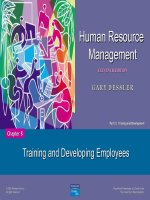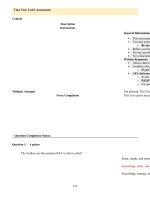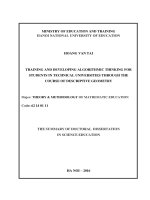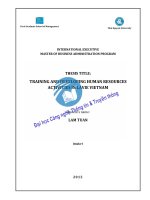Group assignment mgt103 topic training and developing human resources
Bạn đang xem bản rút gọn của tài liệu. Xem và tải ngay bản đầy đủ của tài liệu tại đây (605.64 KB, 12 trang )
*FPT UNIVERSITY- CAMPUS CAN THO
GROUP ASSIGNMENT [MGT103]
TOPIC: TRAINING AND DEVELOPING HUMAN RESOURCES
Name of group member
1. Vo Hoang Vu
2. Bui Nguyen Phu Qui
3. Le Thi Tra Mi
4. Nguyen Thi Hong Mai
5. Nguyen Minh Nhat
FPTU CanTho, 10/2022
TABLE OF CONTENTS
I. Introduction and Method
1.
Introduction
2.
Method
II. Overview of training and human resource development
1.
The concept and role of training and human resource development 1.1. Concept
1.2. The role of training and development
1.3. The importance of training and human resource development
2.
Principles, objectives, and processes of human resource training and development
2.1. Principles of training and human resource development
2.2. Objectives of training and developing human resources
3.
Classification of forms of training and human resource development 3.1. According
to the training content
3.2. In the form of the training organization
4.
The importance of training and human development 4.1. Importance to business
4.2.
III.
Advantages and disadvantages of training and human development
Human resource development strategy IV. Orientation and career development
1.
The role of career orientation and development
2.
The importance of career orientation
3.
Steps to build a training program
V.
Conclusion VI. References
[Group 2. BA1706. GA]
1
I. Introduction and Method
1. Introduction
The problem that my group chooses is training and developing human resources. This is
an issue that businesses are very interested in because society is developing in the trend
of industrialization and modernization. Human resources are considered the core factor,
deciding all the success of the business. A team of innovative, high-quality personnel can
help an organization stand out in a fiercely competitive market. Therefore, the training
and development of human resources should be a top priority.
In particular, according to research from Mckinsey & Company (1), HR directors all
agree that businesses should implement policies that focus on people and attract talent. At
the same time, the management should start changing the benefits packages to boost
employee morale in the new market context.
2. Method
Understand the methods of training and developing human resources in enterprises. Apply
researched theories to understand the current situation of human resource training and
development in companies. Draw out the remaining limitations in the training and
development of human resources at companies. Propose measures to improve the existing
limitations and improve the mining work to create human resources.
Using available and statistical information from magazine articles, books, and related
information on human resource training and development.
II.
1.
Overview of training and human resource development
The concept and role of training and human resource development 1.1. Concept
Training and development are crucial
strategic tools for effective individual and
organizational performance. Thus,
organizations are investing in it with
confidence that it will earn them proper
behavior and attitude, and in turn a
competitive advantage in the world of
business (Franklin, Cowden, and Karodia.,
2014; Siddiqui., 2012). Training is a
deliberate activity conducted by
organizational leaders to create necessary knowledge and skills and to improve the
behaviors of employees in a way that is reliable with organizational goals (Absar et al.,
2010; Singh and Mohanty., 2012).
[Group 2. BA1706. GA]
2
Training is more of a learning activity to obtain better knowledge and skill required to
perform a particular task (Jacobs and Washington, 2003). Employees who have been
provided with training opportunities are more pleased with their job than those who have
not (Franklin et al., 2014). Therefore, training is required for better productivity,
satisfaction, and well-being in the operation of specific equipment, or required for an
effective sales force, to mention a few. Hence, to come up with the desired knowledge,
skills, and positive behaviors from employees, that may have an impact on employees’
satisfaction, commitment, and motivation to their job. According to Wright et al. (2014)
employees are the most asset of the organization, they can either build or break their
company's reputation as well as profitability.
1.2.
The role of training and development
Training mainly focused on learning basic knowledge and skills necessary for a particular
job or a cluster of jobs (Singh and Mohanty, 2012), while development, refers to the
individual in all respects enhancing knowledge, behaviors, thoughtfulness, and
competencies for solving future challenges (Charity, 2015). According to Costen and
Salazar (2011)training programs are aimed at improving and maintaining a particular
current job performance while development seeks to enhance skills for future jobs and
responsibilities.
The development viewpoint examines the existing environment, and assists people on a
team, in a department, and as part of an organization, identifying effective strategic
leadership for enhancing positive behavioral outcomes and performance. According to
Armstrong and Taylor, (2020) training in an organization normally involves a systematic
approach, followed by a series of actions or processes.
1.3. The importance of training and human resource development
Human resource is the core asset of any
organization and its training and
development will mutually benefit to
organization and individual to achieve its
mutual goals. So every modern
management has to develop the
organization through human resource
development. Employee training and
development is an important sub-system of
human resource development. Employee
training and development is an important
function of human resource management.
[Group 2. BA1706. GA]
3
2.
Principles, objectives, and processes of human resource training and development
2.1. Principles of training and human resource development
Training represents a significant portion of the adult education market, yet many believe
the principles of training are not aligned with the principles of adult education. A
literature review supports the inclusion of training within the adult education field by
comparing their respective philosophies and aims, their assumptions about adult learners
and the learning process, and the role that teachers play in each. It concludes that the
level of success of any adult learning experience is contingent on the collaboration of the
learner, facilitator, and methods. Organized adult learning activities that adhere to
andragogical principles must be considered adult education even if those activities are
termed "training." It may be time for adult education professionals to abandon the line of
demarcation between training and adult education and focus instead on combining the
strengths of both to create a new definition of adult education.
2.2.
Objectives of training and developing human resources
Training and development is a combined role often called human resources development
meaning the development of “Human” resources to remain competitive in the
marketplace in achieving objectives. Training focuses on doing activities today to
develop employees for their current jobs and development is preparing employees for
future roles and responsibilities. It carries out an analysis that the objective of training
and development is to creative learning organizations which ensure that employees
through value addition can effectively perform their jobs, gains competitive advantage
and seek self-growth: this measurable performance resulting from good training and
development, shall enhance organization development. It is a process transferring
information and knowledge to employers. It is equipping employers to translate that
information and knowledge into practice with a view to enhancing organization
effectiveness and productivity, and the quality of a management of people. It should be
considered along with education policies and systems which are crucial to the
development of human resources.
3.
Classification of forms of training and human resource development 3.1. According
to the training content
Job-oriented training: a formula for training skills to perform a certain type of work.
Enterprise-oriented training: corporate culture integration training, typical handling,
skills, and working methods in enterprises.
Matsuo, development is divided into two types, namely formal and informal development.
Employee training and development goals and expectations according to Wulnye, Aikins,
and Abdul-Fatawu, the objectives of employee training and development
[Group 2. BA1706. GA]
4
are 1.) Increasing appreciation of the soul and ideology; 2.) Increase work productivity;
3.) Improve the quality of work; 4.) Improve the determination of human resource
planning; 5.) Improve moral attitudes and morale; 6.) Increase stimulation so that
employees are able to perform optimally; 7.) Improve work health and safety; 8.) Avoid
obsolescence; 9.) Improve employee development [8]. A system is a network of
procedures that are interconnected, gathered together to carry out an activity or complete
a particular goal.
3.2. In the form of the training organization
There are a number of different types of training we can use to engage an employee.
These types are usually used in all steps in a training process (orientation, in-house,
mentorship, and external training). The training utilized depends on the amount of
resources available for training, the type of company, and the priority the company places
on training.
Training of the employees is possible if they believe that the resulting modification in the
behavior is in their own interest and they can perform their job in a better way after
attending the particular training program because learning is a self-activity and employee
development is self-development. The various types of training imparted to the
employees in an organization are as follows: Induction Training, Job Training,
Promotional Training, Apprentice Training,...
4.
The importance of training and human development 4.1. Importance to business
Training and development programs provide a host of benefits. They
enhance employee performance, boost employee productivity, reduce
employee turnover, and improve company culture. Explore the importance
of training and development programs for employees and employers by
pursuing a career in human resources.
[Group 2. BA1706. GA]
5
Human resource training and development is determined that most SMEs
are focusing on other departments of management that consider training an
important aspect of human resource development and therefore achieve
organizational goals. At the same time, some organizations receive training
programs based on the requirements and skills needed to do the job.
4.2.
-
The present study attempted to identify the changes in employee skills
during pre-training and post-training periods, the study was carried out by
taking several organizations and their employees there. And has
demonstrated the effectiveness of hands-on skills training of staff in the
study area.
Advantages and disadvantages of human training and human development
Advantageses:
•
Up-skilling Employee: Upskilling is training your employees about
new technologies or improved systems to help them advance in their current position.
•
Less Supervision: Supervising and supervisors are important because
employees who quit are more likely leaving a bad manager than a bad company, Paycor
contends. Many managers assume good management requires giving employees feedback
about everything they do – as often as possible. From the employees' perspective, this can feel
like they're being smothered and killing their motivation to excel.
•
Growth Opportunities for Individuals: Personal growth is important
in many aspects of life, including your career. Determining the right personal growth methods
for you depends on your strengths, challenges and goals. Understanding personal growth and
how you can achieve it can help you use your skills efficiently in the workplace and advance
professionally.
•
Boost in Company’s Productivity: Any task done faster, more
efficiently and better than competitors give a business an edge. Increased productivity leads to
increased competitiveness. With reduced operational cost, the business can provide products
and services at a lower price as competitors which increases the value add to the customers.
•
Better use of Resources: Proper utilization of resources is important
for maintaining productivity because it prevents staff from underperforming or being
overburdened by workloads and burning out.
[Group 2. BA1706. GA]
6
Projects can be managed with better visibility, reducing the risk of
oversights.
-
Disadvantages:
•
Training & Skill Development Cost Time and Money: After
spending time and money searching for top talent, you might not want to hear that the work
isn’t over. But, training new employees is a necessary part of onboarding. You must pour time
and money into ensuring new hires understand their job responsibilities. Improper training
can lead to sloppy work or eventual employee turnover, which means repeating the whole
process.
•
Sparing Extra time for Training can be Stressful for Workers:
Employees are oftentimes asked to participate in the skill development program after ending
their shifts. This extra time hard to manage as they are less likely to spend it with their
families.
•
Lack of Interest: Job dissatisfaction refers to unhappy or negative
feelings about work or the work environment. There exist many factors which may result in
job dissatisfaction. Some of them are poor working conditions, overwork, low levels of pay,
no scope of promotion or career advancement and lack of recognition.
•
Switching to a New Job: There may be many reasons for leaving the
company. Every company has some good aspects and some bad aspects so if you want to
leave the company, you should frame your answer in such a way that it could reflect the good
and bad things of the company instead of only showing the bad aspects. Your balanced
response will help you to get a job in a new company.
III.
Human resource development strategy
Human resource development: Human resource
development is a process of developing and/or
unleashing human expertise through organization
development and personnel training and
development for the purpose of improving
performance. Components of human resource
development: The two major components of
HRD are (1) training and development and
[Group 2. BA1706. GA]
7
(2) organization development. In addition, HRD has three critical application areas: human
resource management, career development, and quality improvement.
Organization development: Organization development is the process of systematically
implementing organizational change for the purpose of improving performance. Training
and development: Training and development is the process of systematically developing
expertise in individuals for the purpose of improving performance. Performance: There
are three levels of performance: organizational, process, and individual. HRD values:
HRD practices should be theoretically and ethically sound. HRD calls upon theories from
multiple disciplines. Thus, the problem of connecting sound theory and sound practice
within a theoretically sound and ethical framework is an important part of HRD theory
and practice.
IV. Orientation and career development
1.
The role of career orientation and development
For individuals: develop professional ability, have the right career choice
decision.
For the company: help the administrator to recruit talented employees
suitable for the job, exploit the employee's ability properly.
2.
The importance of career orientation
Young people today face many difficulties and challenges in choosing a career. In
addition to persistent economic uncertainties, increasing competition and insecurity
(MacDonald & Giazitzoglu, 2019), young people themselves are changing the
employment landscape. A transition that some call creates a 'risk regime' (Beck, 2000),
where individuals seek more autonomy to create their own work patterns, and where they
are no longer just looking for stable jobs, but for careers that generate passion and
creativity (Beck, 2000; Forbes,
2020; Tewari & Bhattacharyya.,
2017).
Given the rapid pace of growth and
the lure of careers in business, tech,
and social media (Bayern., 2019;
Schroeder, 2020), the young
cohort, also known as the 'technical
natives' number' (Tewari &
Bhattacharyya., 2017), faced with
even more complexity and more
diverse career options to fulfill.
Career guidance will help the
students to fulfill their aspirations
[Group 2. BA1706. GA]
8
by setting up realistic goals. As mentioned earlier, career choice will determine the future
of the students not only by providing them their dream job but also by providing them a
better future with a job.
3.
Steps to build a training program ( Explorance., 2021)
Assess training needs: The first step in developing a training program is
to identify and assess needs. Employee training needs may already be established in the
organization’s strategic, human resources or individual development plans. However, if
you’re building the training program from scratch (without predetermined objectives), you’ll
need to assess which areas to focus on.
Set organizational training objectives: The training needs assessment
process (organizational, task & individual) will identify any gaps in your current training
initiatives and employee skill sets. These gaps should be analyzed, prioritized, and turned into
the organization’s training objectives. The ultimate goal is to bridge the gap between current
and desired performance/knowledge through the development of a training program that has
business goals at its core. At the employee level, the training should match the identified areas
where improvement is needed. This can be comprehensively identified through 360 feedback
and evaluations.
Create a training action plan: The next step is to create a
comprehensive action plan that includes learning theories, instructional design, content,
materials and other training elements. Resources and training delivery methods should also be
detailed. While developing the program, the level of training and participants’ learning styles
need to also be considered. Many companies pilot their initiatives and gather feedback to
make adjustments well before launching the program company-wide.
Implement training initiatives: The implementation phase is where the
training program comes to life. Organizations need to decide whether training will be
delivered in-house or externally coordinated. Program implementation should consider
employee engagement and learning KPI goals, as well as thoroughly planning the scheduling
of training activities and any related resources (facilities, equipment, create questionnaire
process etc.). The training program is then officially launched, promoted and conducted.
During training, participant progress should be monitored to ensure that the program is
effective.
[Group 2. BA1706. GA]
9
Evaluate & revise training: As mentioned in the last segment, the
training program should be continually monitored. In the end, the entire program should be
evaluated to determine if it was successful and met training objectives. Feedback should be
obtained from all stakeholders to determine program and instructor effectiveness, plus
knowledge or skill acquisition. Analyzing this feedback alongside an employee performance
review will allow the organization to identify any weaknesses in the program and built a more
robust People Insights strategy At this point, the training program or action plan can be
revised or re-assessed if objectives or expectations are not being met.
V.
Conclusion
Human resource training and development is the process of providing knowledge,
perfecting skills, and training professional qualities for employees in an enterprise in
order to meet current and current job performance requirements future.
Human resource training helps:
-
Compensating employees for their education.
specialize.
Provide employees with practical skills and experience in the field
-
Update knowledge, and expand understanding.
Thereby helping employees to complete the assigned tasks well. Human resource
development is often expressed through promotion, promotion of subordinates to higher
positions or positions, or assigning employees to jobs with higher or more important
requirements. Human resource development is not only to get a guaranteed human
resource in terms of quantity and quality but also a form of employee compensation
through employment.
VI. References
Desta, A. G. (2021). Linking human resource training and development, employee
commitment and job satisfaction: The moderation role of the work environment.
International Journal of Management, Entrepreneurship, Social Science and Humanities,
4(1). />Puleka, D., Kakade, K. S., & Pulekar, N. (2018). Comparative Analysis of Training and
Development Practices in Fast Food Segment – McDonalds and KFC. International
Journal of Advance and Innovative Research, 5(3).
Galusha, J. M. (1998). Principles of Training and of Adult Education: A Comparison.
[Group 2. BA1706. GA]
10
Hammond, H., & Churchill, R. Q. (2018). The role of employee training and
development in achieving organizational objectives: A study of Accra Technical
University.
Akbar Hidayat, W. G. P., Sukesi, S., & Hadi, C. (2020). The Role of Competency on The
Effect of Training and Development System toward Job Productivity in The Human
Resource Management Universal Corporation. Sinergi : Jurnal Ilmiah Ilmu Manajemen,
10(1). />Kirkpatrick, D. L. (1977). Determining training needs: Four simple and effective
approaches. Training and Development Journal, 31(2), 22-25.
/>Anuradha, T. S., & Ramesh, H. N. (2020). Training as an Effective Tool for Developing
Performance of MSMEs- An Empirical Evidence. Shanlax International Journal of
Management, 7(3). />Swanson, R. A. (1995). Human resource development: Performance is the key. Human
resource development quarterly, 6(2), 207-213.
Khattab, N., Madeeha, M., Modood, T., Samara, M., & Barham, A. (2022). Fragmented
career orientation: the formation of career importance, decidedness and aspirations
among students. International Journal of Adolescence and Youth, 27(1).
/>Abrahamsen, B., & Drange, I. (2015). Ethnic minority students’ career expectations in
prospective professions: Navigating between ambitions and discrimination. Sociology,
49(2), 252–269. />
[Group 2. BA1706. GA]
11









